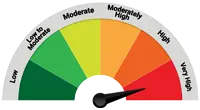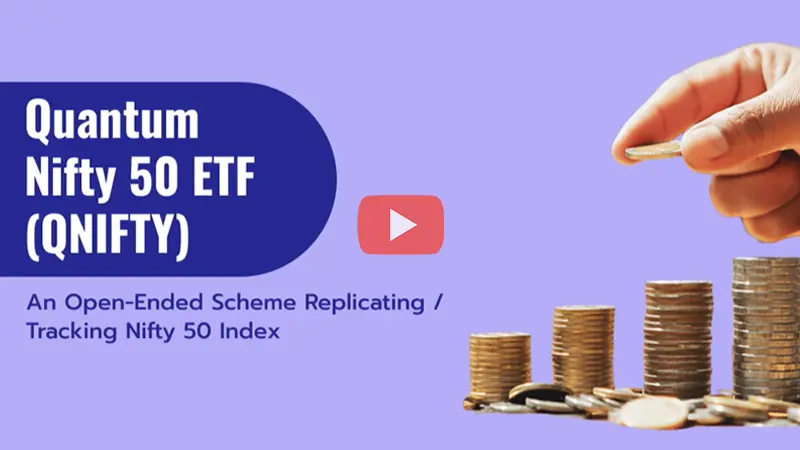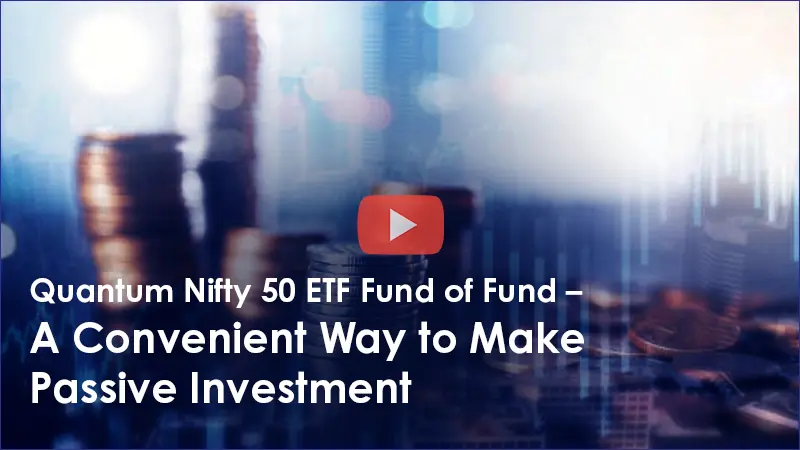Index Funds offer you the opportunity to replicate the composition of a specific index and generate returns that closely correspond with the respective benchmark index.
What are Index Funds?
As per the regulatory guidelines, an Index Fund is a mutual fund that is mandated to invest a minimum of 95% of its total assets in securities of a particular index (which is being replicated/ tracked by the scheme). Your investment success will be hinged on how the respective underlying index fares. The fund manager does not play an active role in managing the weights of the securities in the portfolio, instead they just mimic the composition of an underlying benchmark index. Thus, an Index Fund would never outperform or underperform its respective benchmark index, and if it does by a small margin, it would only be on account of the tracking error.
Active Mutual Funds vs Index Funds
| Particulars | Active Mutual Funds | Index Funds |
|---|---|---|
| Strategy | The fund manager has an active role in purchasing and selling the underlying assets of these funds based on market conditions. | The fund manager has a passive role here and simply follows the movements of the benchmark indices. |
| Returns | The fund manager aims at outpace the benchmark returns. | The fund manager aims to track the performance of the benchmark index by mirroring its composition. |
| Expense ratio | These funds have a higher expense ratio since they are managed actively. | These funds have a lower expense ratio since they don't have to be monitored continuously. |
Types of Index Funds

Broad Market Index funds
There are Index Funds tracking the broader market index like the NIFTY 500, which provides...
There are Index Funds tracking the broader market index like the NIFTY 500, which provides exposure to top 500 stocks across market cap and sectors.

Market Capitalisation Index funds
It tracks the indices that are weighted by their market capitalisation. For instance, the...
It tracks the indices that are weighted by their market capitalisation. For instance, the BSE Large cap Index, the NIFTY Midcap 150, NIFTY Smallcap 250, etc.

Factor-based Index funds (Smart-beta)
The stock selection and weights are based on pre-defined factors like value, momentum, quality, low volatility etc. Most smart-beta funds consist of a single factor such as...
The stock selection and weights are based on pre-defined factors like value, momentum, quality, low volatility etc. Most smart-beta funds consist of a single factor such as the Nifty 100 Quality 30 Index, Nifty 50 Value 20 Index, etc. In addition, some multi-factor Index Funds replicate an index that uses a mix of factors, e.g., the Nifty Alpha Low Volatility 30 Index.

Equal Weight Index funds
One way to counteract the over and under-weightage of a market-cap-weighted index is to go for an equal-weight index. It assigns the same or equal weight for every...
One way to counteract the over and under-weightage of a market-cap-weighted index is to go for an equal-weight index. It assigns the same or equal weight for every stock at the time of rebalancing; for instance, all the 100 companies under the NIFTY 100 Equal Weight Index are conceptually weighted at an equal 1%.

Sector-based Index funds
These invest in businesses operating within a particular industry or sector, such as banking, technology, healthcare, infrastructure, consumption, etc. Sector-based Index Funds track sectoral indices like...
These invest in businesses operating within a particular industry or sector, such as banking, technology, healthcare, infrastructure, consumption, etc. Sector-based Index Funds track sectoral indices like the Nifty Infrastructure Index, BSE Bharat 22 Index, BSE Healthcare Index, BSE Financial Services, etc.

International Index funds
These funds aim to track multiple offshore indices such as the 500, NYSE...
These funds aim to track multiple offshore indices such as the 500, NYSE FANG+ Index, NASDAQ-100 Index, etc.

Debt Index funds
Debt-based Index Funds such as Target Maturity Index Funds are quite useful in mitigating the interest rate risk and credit risk in your portfolio. These funds track a custom indices like -- CRISIL...
Debt-based Index Funds such as Target Maturity Index Funds are quite useful in mitigating the interest rate risk and credit risk in your portfolio. These funds track a custom indices like -- CRISIL IBX 60:40 SDL + AAA PSU Index – April 2025, which invests in a 60:40 proportion of quality SDL and AAA PSU bonds.
How Do Index Funds in India Work?
An index comprises a group of securities defining a specific market segment. Index Funds in India track a certain index and are managed passively. The securities to be included are traded depending on the underlying benchmark’s composition. The returns are nearly equal to the benchmark apart from a difference called the tracking error.
How to invest in Index Funds?
Investors can invest in Index Funds directly through AMC or through distributors, either online or offline. While investing, remember that unlike ETFs, an index fund is not traded on the exchange, and thus transacting real-time is not possible. Instead, transactions are executed at the day-end Net Asset Value (NAV) declared by the fund house by approaching the fund house or its distributors. Both, lump sum and Systematic Investment Plan (SIP), transactions can be done in Index Funds.
What are the advantages of investing in Index Funds?

Simple and convenient to understand
Index Funds are simple to understand and keep track of. If you are a new investor and find it difficult to choose the right fund from the plethora of available active funds, then Index Fund is a convenient option to add to your portfolio.

Lower risk compared to Active Funds
Compared to actively managed funds, the portfolio turnover in Index Funds is based on the underlying index and hence the unsystematic risk is also lower as compared to Active Funds. Your returns will always be similar to the returns generated by the underlying benchmark index of your Index Fund.

Low cost as compared to active funds
Typically, the expense ratio of Index Funds is lower than the actively managed equity funds which makes it cost-efficient.
Best Index Funds in QAMC
Quantum Mutual Fund offers several mutual fund schemes in India that invest in equities, Gold, bonds, multiple asset. The company allows investors to start an SIP in any of its schemes with an amount as low as ₹500, besides offering an option to hold the units in the Demat mode.

Quantum Nifty ETF Fund of Fund
An Open-ended fund of fund investing in units of Quantum Nifty 50 ETF.
Quantum Nifty 50 ETF
An Open Ended Scheme Replicating / Tracking Nifty 50 Index.
Who Should Invest in Index Funds?
Investors who are new to mutual fund investing, have high risk appetite, an investment time horizon of 5 to 7 years, and wish to mimic a particular index (and not take the extra risk of an actively managed diversified mutual fund scheme), yet reap the benefits of diversification, may consider investing in Index Funds. Compared to actively managed mutual fund schemes (viz. diversified equity schemes, sector & thematic funds, hybrid funds, etc.), the portfolio turnover is low, the expense ratio is lower, and so is the risk. Index Funds are a simple and convenient option for investors who find it difficult to choose the fund from the plethora of available active funds. That said, make a prudent choice when you add Index Funds to your investment portfolio and avoid overcrowding the portfolio.
How to Choose the Right Index Funds?
Consider the following factors to pick the best Index Fund:

Cost
When deciding between two similar Index Funds, prefer the one with a lower expense ratio as it can make a difference to the overall portfolio returns in the long run.
 2.webp)
Tracking error
The Tracking error is the deviation of an Index Fund's returns from its underlying index. Prefer Index Funds that have low tracking error compared to similar schemes in the category which will ensure that the performance of the fund does not deviate much from the underlying index.
How are Index Funds Taxed?

Equity-Oriented Index Funds
The capital gains on redemption of equity-oriented Index Funds are taxed at the rate of 15%...
The capital gains on redemption of equity-oriented Index Funds are taxed at the rate of 15% if the holding period is less than one year. For units redeemed after one year, the long term capital gains are taxed at 10% if the gains exceed Rs 1 lakh in a financial year.

Non-Equity-Oriented Index Funds
The capital gains on redemption of non-equity-oriented units (Debt Index Funds and...
The capital gains on redemption of non-equity-oriented units (Debt Index Funds and International Index Funds) are taxed as per income tax slab rates applicable to investors.
Know more about Index Funds
-
What is Nifty 50 Index?
Diversify across the top* companies in different sectors through single investment. In this video we will explain what is nifty 50 ETF fund and benefits of investing in Quantum Nifty 50 ETF.
-
Quantum Nifty 50 ETF Fund of Fund
Learn more about Quantum’s market differentiated offering - Quantum Nifty 50 ETF Fund of Fund with a proven track record of 14 years and counting.
Product Labelling
| Name of the Scheme | This product is suitable for Investors who are seeking* | Risk-o-meter of Scheme |
|---|---|---|
|
Quantum Nifty 50 ETF An Open Ended Scheme Replicating / Tracking Nifty 50 Index. |
• Long term capital appreciation • Investments in equity and equity related securities companies in Nifty 50 Index |

Investors understand that their principal will be at Very High Risk. |
|
Quantum Nifty ETF Fund of Fund An Open-ended fund of fund investing in units of Quantum Nifty 50 ETF. |
• Long term capital appreciation and current income • Investments in units of Qauntum Nifty 50 ETF - Exchange Traded Fund |

Investors understand that their principal will be at Very High Risk. |
*Investors should consult their financial advisers if in doubt about whether the product is suitable for them.
Disclaimer: The views expressed here in this Article / Video are for general information and reading purpose only and do not constitute any guidelines and recommendations on any course of action to be followed by the reader. Quantum AMC / Quantum Mutual Fund is not guaranteeing / offering / communicating any indicative yield on investments made in the scheme(s). The views are not meant to serve as a professional guide / investment advice / intended to be an offer or solicitation for the purchase or sale of any financial product or instrument or mutual fund units for the reader. The Article / Video has been prepared on the basis of publicly available information, internally developed data and other sources believed to be reliable. Whilst no action has been solicited based upon the information provided herein, due care has been taken to ensure that the facts are accurate and views given are fair and reasonable as on date. Readers of the Article / Video should rely on information/data arising out of their own investigations and advised to seek independent professional advice and arrive at an informed decision before making any investments. None of the Quantum Advisors, Quantum AMC, Quantum Trustee or Quantum Mutual Fund, their Affiliates or Representative shall be liable for any direct, indirect, special, incidental, consequential, punitive or exemplary losses or damages including lost profits arising in any way on account of any action taken basis the data / information / views provided in the Article / video.
Mutual fund investments are subject to market risks read all scheme related documents carefully.
Frequently Asked Questions on Exchange Traded Funds (ETF)
Yes, unlike ETFs, investment in Nifty ETF Fund of Fund can be done without a Demat Account.
Since Nifty 50 ETF invest in the listed 50 companies of the Nifty 50 Index, they are prone to market volatility. So, a fund investing in an ETF cannot be construed as safe. You need to maintain a long term horizon for risk adjusted returns.
A Nifty 50 ETF Fund may be prone to market risks along with the chances of high tracking error.
Nifty 50 ETF funds are suitable for long-term goals with a high-risk appetite. You need to evaluate the tracking error, expense ratio and the track record of the fund.
Nifty 50 ETF Fund of Fund can be bought directly through an AMC or mutual fund distributor but to buy NIFTY 50 ETF, investors need to have a trading & Demat account.
All transactions of Nifty 50 ETF Fund of Funds are carried out at the closing NAV whereas ETFs can be purchased and sold at the prevailing real-time NAV.
Generally, the expense ratio of an index fund is higher than that of an ETF, though it is lower than actively managed funds. However, it is important to determine the total cost of ownership when you invest in ETFs, which can include additional expenses such as annual charges for trading account, brokerage on transactions, etc.




